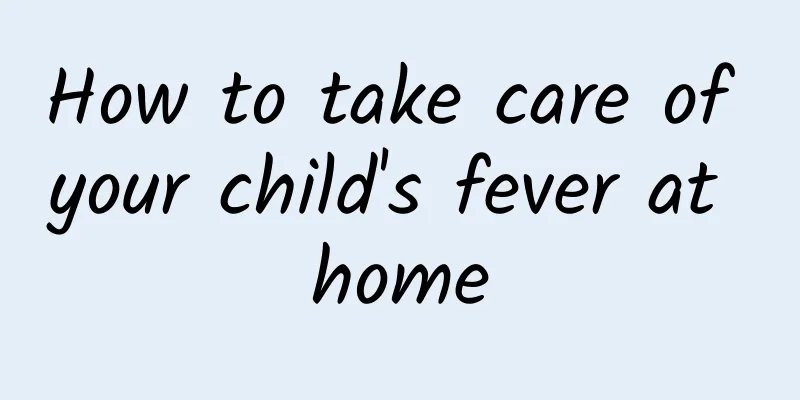How to take care of your child's fever at home

|
If the child's temperature exceeds 38.2℃, parents need to give the child antipyretics in time. The specific medication plan needs to be used under the guidance of a doctor. You can refer to "Which medicines can be chosen when a child has a fever". However, parents should pay attention to avoid the following misunderstandings when caring for their children. 1. Children should not be dressed in thick clothes or covered with thick blankets: Children will sweat a lot during fever, which is a natural process of the body's self-regulation and heat dissipation. If the child is covered with too thick bedding or wrapped too much, it will hinder the effective dissipation of heat and may even aggravate the fever symptoms. Therefore, it is recommended that the bedding chosen for the child should be as light as possible. 2. Be careful about repeated medication: Acetaminophen and ibuprofen are commonly used antipyretic and analgesic drugs for children with fever. Some parents may mistakenly believe that using the two drugs together can improve the antipyretic effect. In fact, ibuprofen and acetaminophen have similar antipyretic effects. If the two are used at the same time, it is very likely to cause the body temperature to drop too quickly, and the side effects of the drugs will overlap, which may cause nausea, vomiting and other discomfort symptoms, and in severe cases, even damage to the liver and kidneys of children. 3. Do not mistake the antipyretic patch for antipyretic medicine: The antipyretic patch is a commonly used physical cooling product, the main component of which is gel. This product achieves a cooling effect by absorbing and taking away the body's surface heat through the vaporization process of the water in the gel, but it cannot really lower the body temperature. It is only a symptomatic treatment and has no therapeutic effect on the root cause of the fever. If the child's body temperature exceeds 38.2℃, it is usually difficult to achieve significant results using a antipyretic patch. At this time, you should take antipyretic and analgesic drugs as soon as possible or seek professional diagnosis and treatment from a doctor. 4. Avoid eating too much meat and fish: When a child has a fever, their digestive function weakens, so they should be given a light diet, such as porridge, soft noodles, etc. Try to eat small meals frequently. Do not eat greasy foods such as eggs, pork rib soup, chicken soup, etc. These foods contain a lot of fat, and eating them will increase the burden on the digestive tract of children. Not only is it not conducive to the recovery of the disease, but it may also cause diarrhea. What needs to be emphasized to parents is that home care for children with fever requires comprehensive consideration of multiple aspects, including observation and measurement of body temperature, medication to reduce fever, and precautions. Only by doing these tasks comprehensively and carefully can we help children better cope with the discomfort caused by fever. (Zhang Xiufeng, Inner Mongolia Autonomous Region Maternal and Child Health Hospital) |
<<: Why is juniper pollen so popular? The scientific truth behind the "smoking" of the top streamers
Recommend
Is it easy for a girl with cold hands and feet to get pregnant?
It is not difficult to see people with cold hands...
What to do if menstruation is blocked?
Normally, menstruation will come every month, but...
What are the reasons for weakened intestinal motility in parturients?
Many women will experience abdominal distension o...
Vitamin E removes pigmentation? Guess the effect
Pigmentation is a very common problem on facial s...
Right leg pain during early pregnancy
The root of the thigh is closely related to the r...
Bleeding after period ends
Every normal woman will have her period. When a w...
What is good to eat with brown rice? Is brown rice a coarse grain?
Brown rice can provide the human body with a vari...
Pregnant women with twins weight gain chart
Generally speaking, pregnant women with twins wil...
When can pregnancy usually be detected?
After pregnancy, usually one week after the menst...
About atypical ectopic pregnancy
Medically speaking, ectopic pregnancy is a pregna...
How many days of pregnancy will there be reaction?
Many women need to understand this issue, that is...
What vegetables can you eat during confinement?
There are certain dietary requirements during con...
What do women eat to increase hormones
I believe everyone has heard of the word hormone....
Causes and clinical manifestations of uterine dysplasia
When women are preparing for pregnancy, they need...









